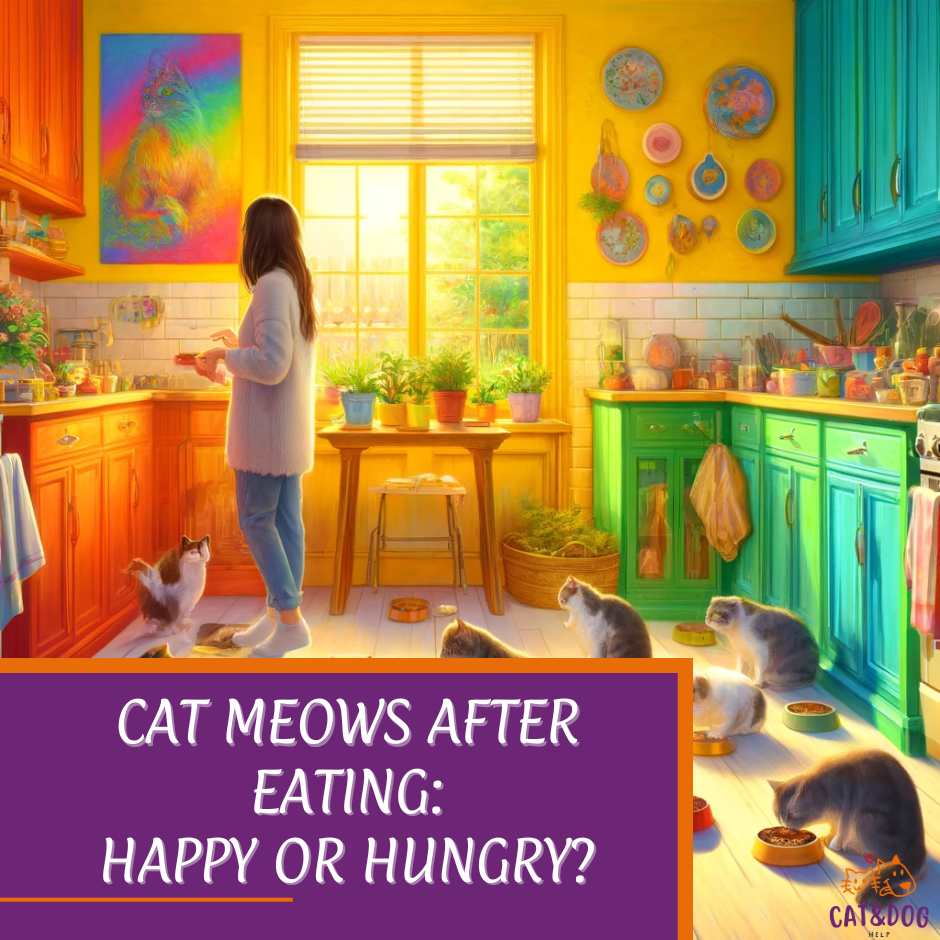Imagine you’ve just filled your cat’s bowl and watched as they’ve eagerly eaten their meal. Moments later, you hear a familiar meow – but it’s not the pre-dinner cry for food; it’s the post-meal serenade.
If you’ve ever wondered why your furry companion voices out after eating, you’re not alone.
Cat owners everywhere are familiar with this curious behavior, often asking themselves, “Why does my cat meow after eating?”
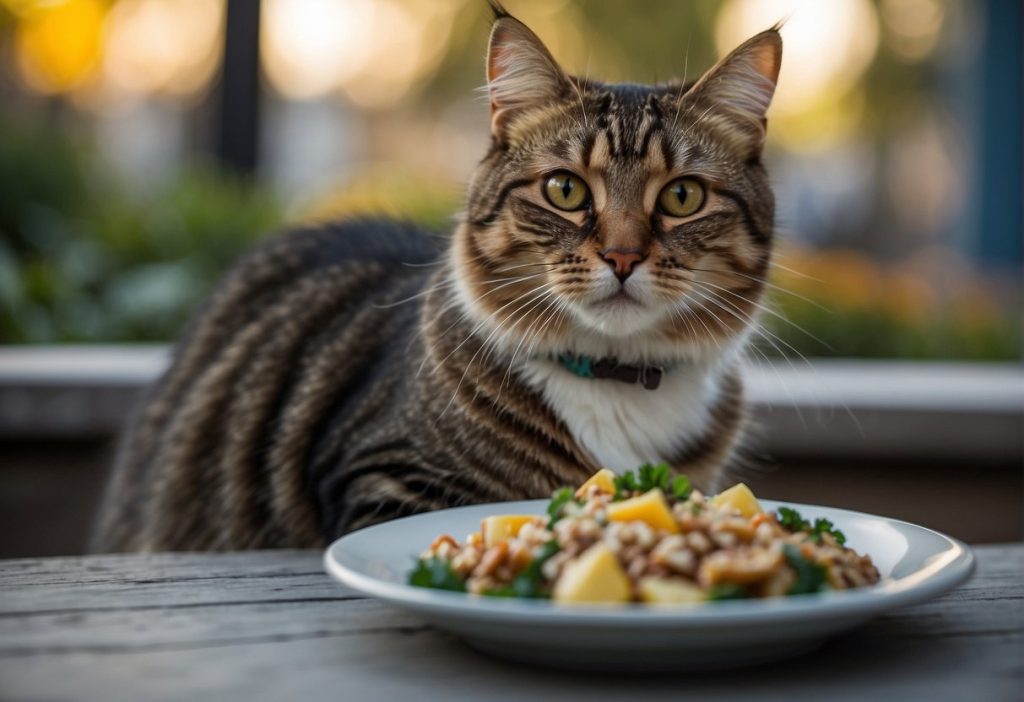
The reasons behind your cat’s post-meal meowing can range from simple satisfaction to indicating health issues.
This article will delve into the various factors that may cause your cat to meow after eating.
Whether it’s a form of communication to express contentment or a signal for something more concerning, understanding these vocalizations is key for any attentive cat owner.
By exploring the possible explanations, we can better personalize our responses to our cat’s unique way of speaking to us.
Key Takeaways
- Meowing can be a cat’s way of communicating contentment or alerting to issues after eating.
- Health concerns and environmental factors influence why a cat may meow post-meal.
- Personal observation and technology can aid in deciphering a cat’s meows.
Understanding Why Your Cat Meows After Eating
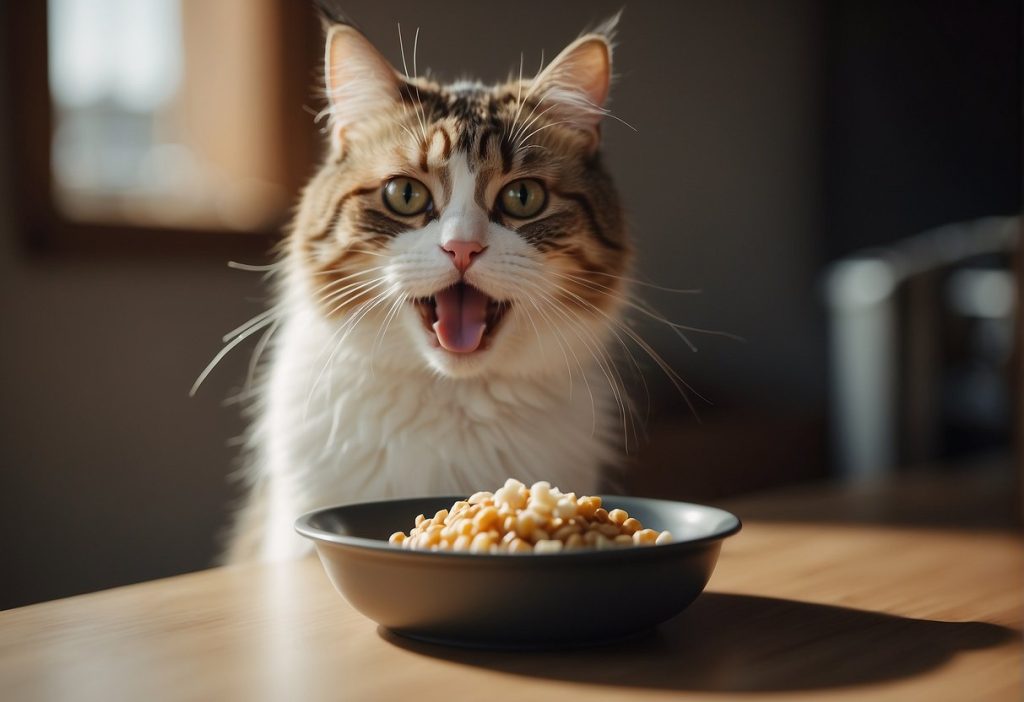
Expressions of Satisfaction are common in our feline friends. Think of it like a cat’s way of saying, “That hit the spot!” (1)
Experts in feline behavior have often likened this to humans expressing a satisfied sigh after a delicious meal.
But wait, there’s more! Ever get that pleading look from your furry companion post-dinner? They might be angling for a second serving.
This is especially true for cats with High Energy Needs or those that are on a diet. After all, who doesn’t get a bit peckish when they’re cutting calories?
It’s interesting to note that the dietary needs of cats can widely vary with kittens and active adult cats requiring more food compared to senior or less active cats.
Here’s a nugget of truth for you: your cat might just want a snuggle. Attention Seeking Behavior post-meal is a thing.
Felines can be quite the social butterflies when they’re done dining and may meow to initiate some quality time.
A cat behaviorist shared a tale of a Siamese cat that would consistently follow its meal with a “talk” that was undeniably a call for cuddles.
So, when your kitty serenades you after supper, they might be echoing a furry “thanks,” asking for just a bite more or hinting at a heart-to-heart. Remember, every meow is a message!
Health-Related Reasons Behind Post-Meal Meowing
This could be their way of telling you that something’s not quite right. Pain and discomfort, often stemming from dental issues or gastrointestinal problems, can cause increased meowing post-dining.
For instance:
- Dental Discomfort:
If your kitty has tooth decay or gum disease, eating might cause pain, leading to those after-meal complaints. - Gastro Troubles:
Conditions like indigestion or a sensitive stomach might be making meal times less enjoyable for them.
Studies in veterinary health have made connections between health issues and vocalization in felines after meals, so it’s wise to listen up if your cat’s chatter changes pitch or intensity.
Dietary Discontent:
Cats can be quite finicky with their food, can’t they? A switch in their diet might not sit well causing post-meal meows. They’re saying, “Hey! This isn’t what I’m used to!”
Consider these points:
- Gradual Introduction:
To avoid a vocal strike, introduce new chow slowly by mixing it with the old, increasing the new food incrementally. - New Diet Blues:
If the menu changes suddenly, they might be telling you they prefer their regular gastronomic delights.
Signs of Gastrointestinal Issues:
Speed-eating or overindulgence might also lead to discomfort, resulting in those post-meal serenades.
Food intolerance, an often-overlooked culprit, can also provoke an upset tummy and consequent meowing.
Here are some insights:
- Fast Eaters: Try puzzle feeders to slow down the gulp-and-go habit.
- Food Intolerance: Keep an eye on what they eat; if meowing follows specific meals, a particular ingredient might be the troublemaker.
Remember, these meows could be more than just talk – they might be signals worth attending to.
If your cat’s post-meal symphony is a regular occurrence, consulting with your vet could bring some quiet and comfort to your furry friend.
Behavioral and Environmental Factors
It might seem they’re gossiping about the latest neighborhood “tail”! In homes with more than one feline, meowing post-mealtime can be a sign of communication. (2)
Your cats could be sorting out their pecking order or simply enjoying the feline version of “table talk.”
Experts on feline behavior observe these post-dinner conversations as a mix of establishing hierarchy and bonding rituals.
Have you ever faced a puzzled purr or a stressed siamese? Older cats or those under stress may vocalize more because of environmental changes or declining health.
Imagine chomping down on a favorite snack and feeling all jumbled up inside—humans talk it out, and cats meow it out!
Creating a Zen Zone for Your Cat:
- Location: Choose a quiet, low-traffic area for feeding.
- Consistency: Keep feeding times and locations the same every day.
- Enrichment: Introduce toys and puzzles to reduce stress and stimulate their mind.
A study on environmental enrichment shows that cats need a positive and predictable atmosphere for optimal well-being.
This means making mealtime a peaceful, pleasure-filled event could very well reduce those anxious after-dinner meows.
Remember, your cat’s meows can be like a language all their own. It’s a mix of “Thanks for the grub!” and “Hey, feeling a bit off here.”
Keep an eye (and ear!) out for those mealtime serenades and consider their deeper meanings—it’s not just noise, it’s communication.
Enhancing Understanding Through Personalization
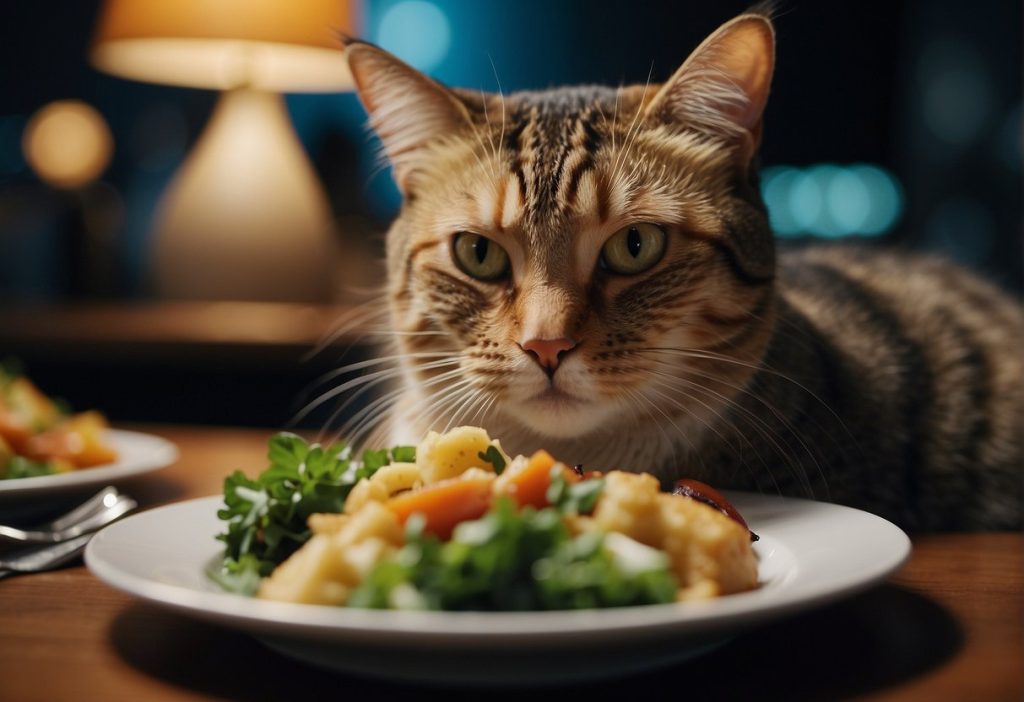
That post-dining serenade could be just them saying “Thanks for the grub!” or might hint at something more.
Let’s explore how you can enhance your understanding of their unique meows through a personalized approach.
Created a “Cat Diary”? You should! Start noting down when your kitty vocalizes after a meal.
Here’s what to track:
- Meal times
- Types of food
- Volume and pitch
- Duration
Considering each cat’s personality and living environment is pivotal. If Mitzy’s from a single-pet home or the elder among your cat clan, her meows might be different.
Have you ever thought of mealtime as a social event for your cat? Perhaps they’re just saying, “Hey, I’m ready for some playtime!” or looking for some cuddles after satisfying their tummy.
Try to answer the questions below in your diary to get a clearer picture:
- Does the meowing change with different companies or locations?
- Is there a pattern over weekends or holidays when the household routine changes?
By skimming daily over your cat diary, you’ll start to see patterns emerge. They might meow more on tuna Tuesdays or be quieter when it’s just the two of you at home.
Discovering these nuances helps you provide a tailored response, whether that means extra playtime post-meal or maybe a belly rub session.
Remember, it’s all about bonding while adapting to your feline friend’s language!
Leveraging Technology for Deeper Insights
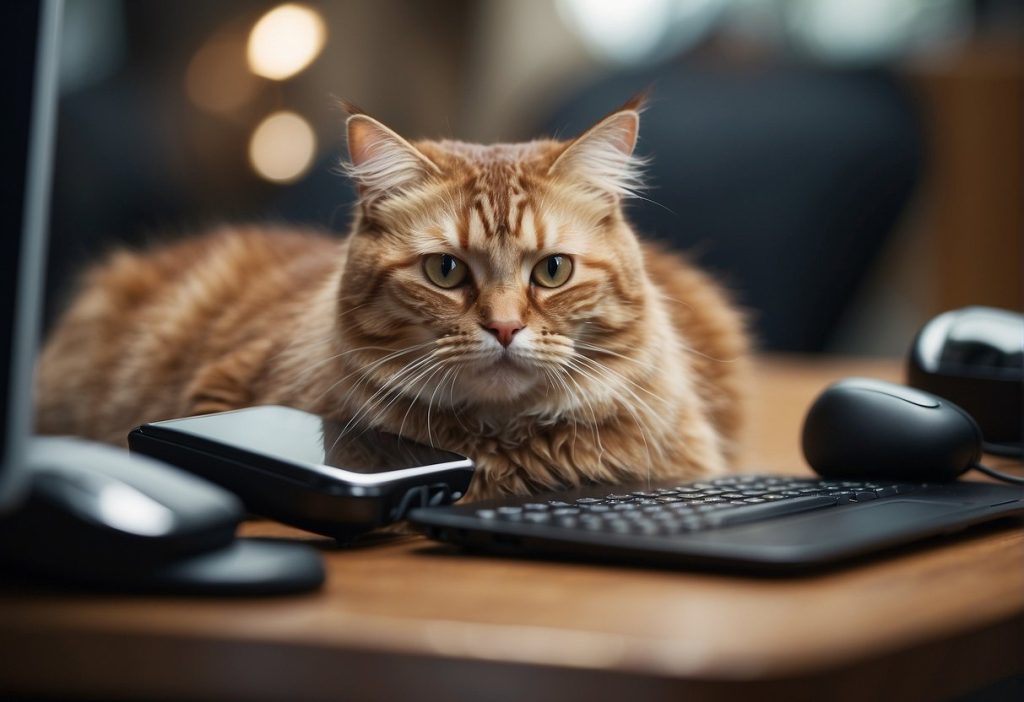
Interactive Tools Picture this: an online quiz that plays a detective with your cat’s meow mysteries. You simply answer a few questions about their after-eating antics and voila!
- Benefits?
- Pinpointing specific behaviors.
- Quick insights into your cat’s wellbeing.
- Pinpointing specific behaviors.
Imagine you’re like Jamie, a fellow cat-parent. Jamie noticed Luna, her tabby, meowing a bit too much post-chow time.
A quick trot through an online quiz led her to discover Luna had a chicken allergy. Who would have thought, right?
Case Study: Meet Luna
- Symptoms: Excessive meowing and fussiness after meals.
- Quiz Result: Possible dietary intolerance.
- Action: Vet visit and dietary adjustment.
- Outcome: Luna’s concert turned into a purr-fest.
Cool Stat Alert: Recipes for a quieter life post-dinnertime can be just a few clicks away. No more guessing games!
So, how about giving these nifty techy tools a try? They might just help you get to the bottom of your furball’s vocal solos after supper.
And who knows? You might even stumble upon a health tip or two that could make your kitty’s mealtime a silent film instead of a meowy musical.
Building a Supportive Community
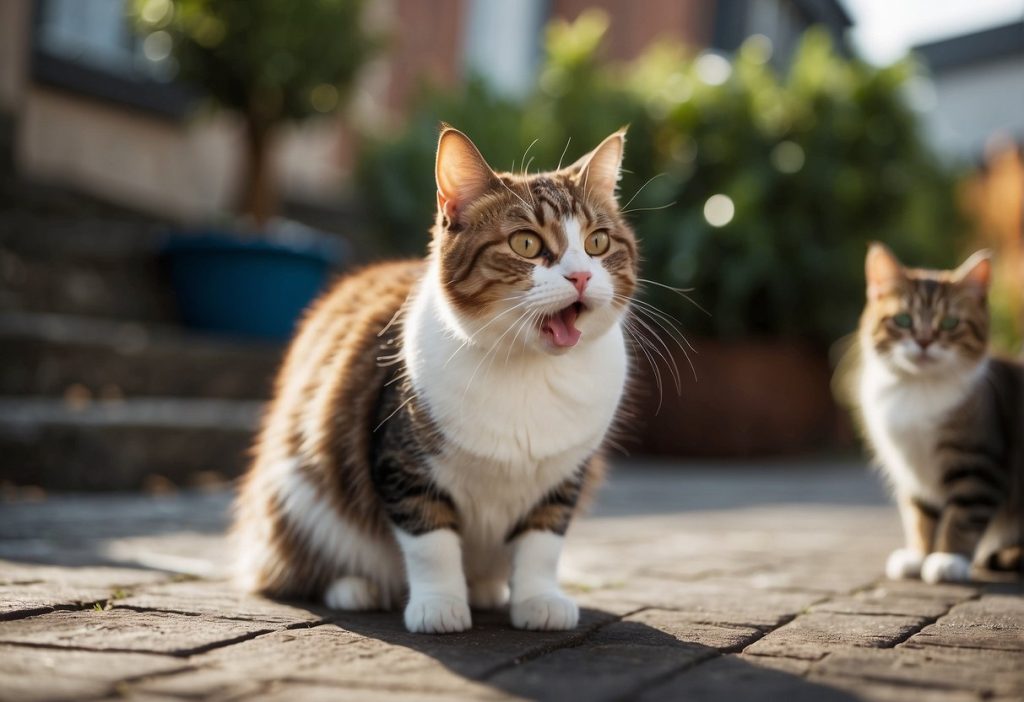
Let’s talk about curating spaces where you can decipher these mysterious meows together.
They’re prime spots to connect with other cat owners who have dealt with similar scenarios. Picture this: sharing stories, solutions, and “aha!” moments with people who genuinely “get it”.
Example Community Success:
- The Happy Cat Forum
- Meow Mix Lounge
Remember, there’s no such thing as a silly question when you’re among friends. These platforms become treasure troves filled with practical tips and heartfelt support.
Did you hear about Sara and her Siamese, Simba? An exchange on Meowy Matters led her to learn that Simba’s after-dinner serenades were due to sheer contentment—thanks to input from her newfound fellow cat guardians.
Types of Support Offered:
- Emotional reassurance – “We’ve been there!”
- Practical advice – “Have you tried a puzzle feeder?”
- Vet suggestions – “Dr. Whiskers worked wonders for us!”
Their collective wisdom might just be the key to understanding your cat’s quirky habits. So, what’s holding you back? Jump in; your cat community awaits!
Don’t forget to pet and praise—sometimes that post-meal meow is just a request for a cuddle!
Addressing Your Cat’s Post-Meal Meowing
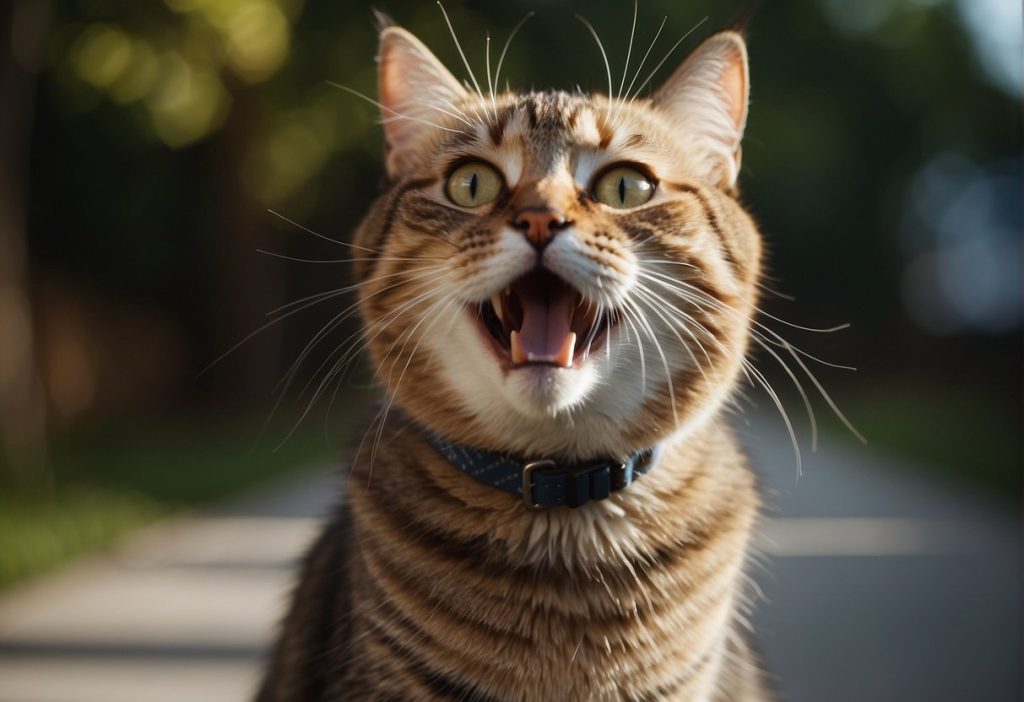
Let’s dive in and figure out how to ensure those after-dinner solos are happy ones.
Ensuring Proper Nutrition
Here’s a step-by-step to make sure you’re hitting the right notes with your cat’s diet:
- Consult a Vet: Chat with your vet about your cat’s diet to confirm it’s nutritionally complete.
- Measure Meals: Use a measuring cup to serve the correct portion size.
- Routine is Key: Keep feeding times consistent to provide a sense of security. (3)
Creating a Comfortable Environment
Cats are royalty, and they know it. So, their dining area should reflect that status. Try these tips to create a mealtime oasis:
- Quiet Zone: Cats prefer to eat in a peaceful area, away from foot traffic.
- Elevate Their Dining: Some cats love a good vantage point. Consider a raised feeder.
- Stress-Free Zone: Keep the peace with multiple cats by providing separate bowls in different locations.
When to Consult a Veterinarian
Meowing isn’t always just chit-chat; it can be a distress signal. If your cat’s post-meal symphony seems off-key, look for these signs:
If your cat tunes up for a solo after eating and these checklist items strike a chord, it’s time for a vet visit.
Your vet can help you understand if these post-meal performances are normal, or if there’s an underlying health solo that needs to be addressed.
So there you have it, a snippet on how to keep your cat’s meow melodious after mealtime.
Who knows, with some care and attention, maybe your kitty’s post-dinner tune could be the next big hit in “Meow-sic” charts!
Quick Recap
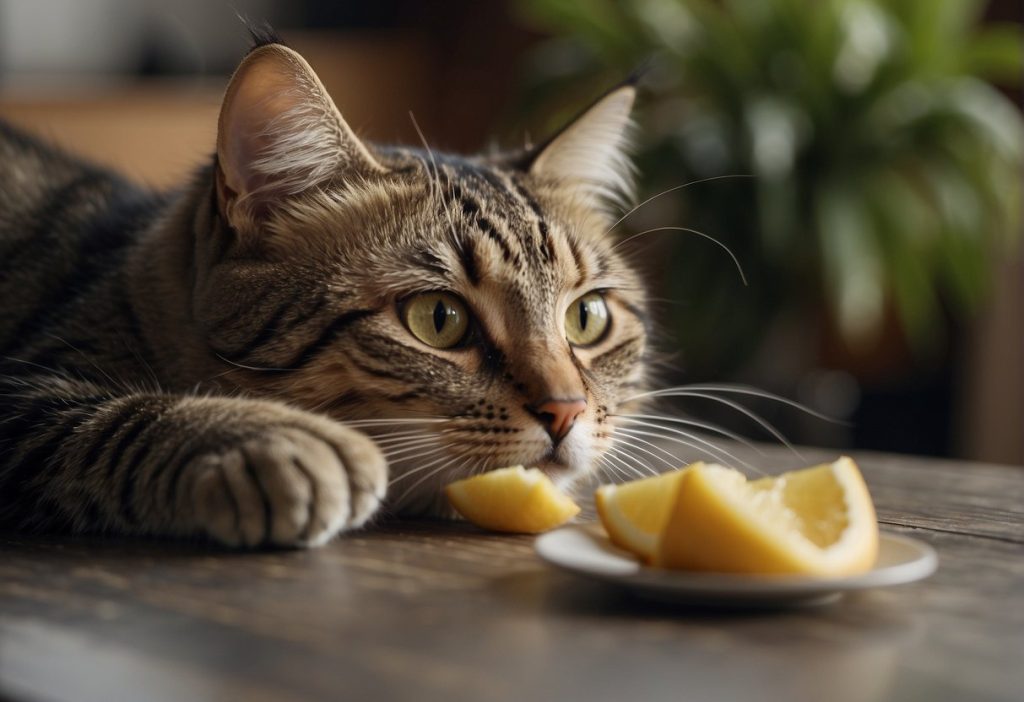
Let’s quickly run through the highlights – no fluff, just the good stuff!
Firstly, satisfaction could be the prime suspect. A meow after dinner might simply mean, “That was purr-fect, thanks!”
On the flip side, if they’re not a fan of the dinner menu, they might be telling you, “Meh, not what I was hoping for.”
Keep an eye out for attention-seeking. Cats are social creatures, and sometimes that meow is an invitation for some quality time with you. So, go ahead and lavish them with a bit of affection.
- Hunger or thirst may still be on their mind. Yes, even after a meal, some cats might be asking for a second helping or a fresh bowl of water.
Here’s a quick points rundown:
- Satisfaction with their meal
- Dislike of the food
- Seeking attention and affection
- Hunger or thirst signals
- Possible underlying health concerns
Sometimes, it’s more serious. Health issues could be the cause. If meowing comes with other concerning signs like vomiting or changes in drinking habits, a vet check-up is a wise move.
And because no one knows your cat better than you, you’re the perfect detective to crack the case. When in doubt, there’s always a vet or fellow cat-loving community member who can chip in with advice.
Do you have your own stories or tips about your cat’s quirky post-meal chats? Share them! The more we pool our knowledge, the merrier our meows.
Frequently Asked Questions
Curious about your cat’s chatty behavior post-dinner? Let’s explore those burning questions you have when your feline friend seems more vocal after enjoying their meal.
Why does my cat meow loudly after eating?
Your kitty might be exclaiming their satisfaction or dissatisfaction with their recent meal.
If the noise is out of the ordinary, it could signal an underlying condition, so keep an ear out for changes.
Can a change in my cat’s diet cause more meowing after meals?
Indeed, a diet switch can sometimes lead to an increase in meows.
If you’ve introduced a new food, your cat could be commenting on the change – whether they’re giving it two paws up or a tail down.
Is it normal for a cat to meow for attention after eating?
Absolutely, it’s normal. Some cats use their meows as a tool to elicit attention or playtime after they’ve eaten.
They might just want some love or to engage in a post-meal zoom around the house.
How can I tell if my cat’s post-meal meowing is due to illness?
If meowing is accompanied by unusual behaviors or symptoms like lethargy, vomiting, or changes in appetite, it could indicate an illness.
A veterinary check-up would be a wise step if there are any concerns.
Should I feed my cat more if they meow after eating?
Not necessarily. Cats are smart and may meow for more food even when they aren’t hungry.
It’s essential to adhere to a feeding schedule and proper portion sizes suited to their needs.
Could my cat’s post-meal meowing be a sign of stress or anxiety?
It’s possible. Stress or anxiety might lead to increased vocalization after meals.
Creating a calm dining environment and sticking to a routine can help ease their nerves.
What interactive tools can help me understand why my cat meows after eating?
Interactive tools like behavior diaries or apps can help you track patterns in your cat’s meowing, which can be insightful.
Observing and noting the circumstances around mealtime can pinpoint triggers or just what makes them happily chat away.

